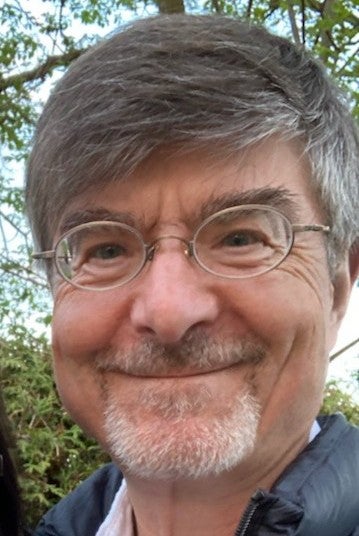
MA, Princeton
BA, British Columbia
Extension:
43359
Email:
easton@uwaterloo.ca
Biography
Born in St. Boniface, I grew up in North Vancouver and studied physics and math at UBC before switching to English. In graduate school I specialized in British literature of the period 1740 to 1830; my dissertation was on cross-dressing in eighteenth-century culture and society, with chapters on Christian Davies, Charlotte Charke, and Christopher Smart. After holding a Killam post-doctoral fellowship in the History Department at UBC, I came to Waterloo where I teach and research eighteenth-century and Romantic literature.
I am a member of the Advisory Board of the Comparative Literature Department at Fordham University. In August 2004 I was a visiting Associate Professor in the Fachbereich Literaturwissenschaft at the University of Konstanz in Germany and in April 2013 I was a visiting Associate Professor in the School of Foreign Languages at Zhejiang Gongshang University in China. From 2003 to 2007 I chaired the Women's Studies Advisory Board, a university-wide committee. From 2008 to 2015 I served two terms as chair of the English Department.
Selected publications
“Jane Austen and the Art of Elocution: Discerning Feeling in Persuasion,” forthcoming in Jakub Lipski and M-C. Newbould, eds., Edinburgh Companion to the Eighteenth-Century British Novel and the Arts(Edinburgh: Edinburgh University Press, 2024).
“Enlightenment and Exchange,” forthcoming in Eugenia Zuroski and Manu Samriti Chander, eds., “Refusing Eighteenth-Century Fictions, Part 2,” Eighteenth-Century Fiction 36 (2024).
“Yorick’s Speech and the Starling’s Song: The Limits of Elocution in A Sentimental Journey,” in W. B. Gerard and M-C. Newbould, eds., Laurence Sterne’s “A Sentimental Journey”: A Legacy to the World (Bucknell University Press, 2021), 121-149.
“Plebeianizing the Female Soldier: Radical Liberty and The Life and Adventures of Mrs. Christian Davies,” Eighteenth-Century Fiction 32.3 (2020): 427-461.
“Smart’s Professors: Birdsong and Rhetorical Agency in Jubilate Agno,” in Christopher GoGwilt and Melanie Holm, eds., Mocking Bird Technologies: The Poetics of Parroting, Mimicry, and Other Starling Tropes (New York: Fordham University Press, 2018): 68-96.
“Christopher Smart’s Elocution,” in Reading Christopher Smart in the 21st Century, edited by Min Wild and Noel Chevalier (Bucknell UP, 2013): 63-84.
“Covering Sexual Disguise: Passing Women and Generic Constraint,” Studies in Eighteenth-Century Culture 35 (2006): 97-127.
“Gender’s Two Bodies: Women Warriors, Female Husbands, and Plebeian Life,” Past and Present 180 (August 2003): 131-174.
“Cosmopolitical Economy: Exchangeable Value and National Development in Adam Smith and Maria Edgeworth,” Studies in Romanticism 42 (2003): 99-125.
“‘Mary’s Key’ and the Poet’s Conception: The Orphic versus the Mimetic Artist in Jubilate Agno,” in Clement Hawes, ed., Christopher Smart and the Enlightenment (New York: St. Martin’s, 1999), 153-175.
“Christopher Smart’s Cross-Dressing: Mimicry, Depropriation, and Jubilate Agno ,” Genre 31 (1998): 193-243.
“The Political Economy of Mansfield Park: Fanny Price and the Atlantic Working Class,” Textual Practice 12 (1998): 459-488.
Fellowships & Awards
-
Outstanding Performance Award, University of Waterloo
- SSHRC (Social Sciences and Humanities Research Council) Standard Research Grant, University of Waterloo
- Isaac Walton Killam Memorial Post-Doctoral Fellowship, Department of History, University of British Columbia
- Princeton University Graduate Fellowship, Princeton University
Current research
I am currently at work on two scholarly projects:
The first project aims to map and make visible a wide range of eighteenth- and nineteenth-century cross-dressing practices, and the complex ways in which those practices were represented across historical periods, report genres, and different sexes and genders (including gender transitions and transgender individuals), especially in periodical reports. One of the outputs of this research is a digital humanities database: the Waterloo Cross-Dressing Archive (WXDA). Another is a Twitter feed for the WXDA.
The second project seeks to explore the theme and practice of communication in Laurence Sterne, Christopher Smart, William Wordsworth, and Jane Austen through the lens of elocution, the foremost theory of communication in Britain c. 1740 to 1820. In an era of increasing print literacy, elocution focused on and sought to theorize the paralinguistic features of performed speech such as gesture and tone, which among other things were seen as communicative attributes shared between humans and animals. This "body language" gives a materialized rhetorical shape to matters that can otherwise seem inchoate, abstract, or spiritualized, such as sensibility, identity, embodiment, affect, and sentiment.
Areas of graduate supervision
- Eighteenth-century and Romantic literature
- The novel
- Political economy and empire (Adam Smith, Maria Edgeworth)
- Gender and sexuality studies; literary theory (especially Foucault)
- Enlightenment rhetoric and media